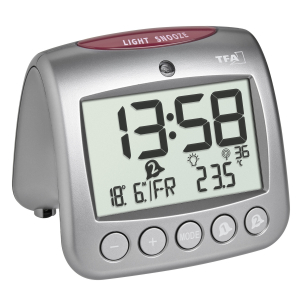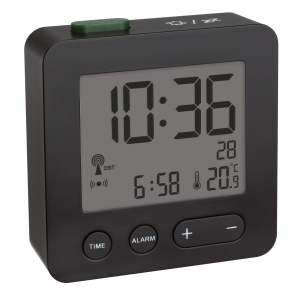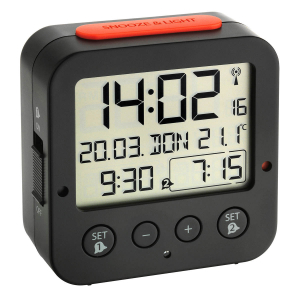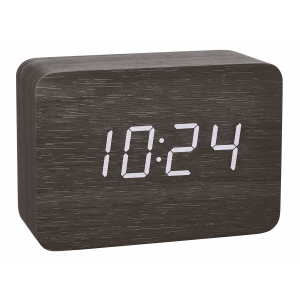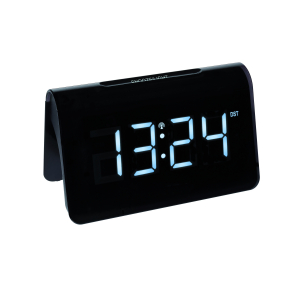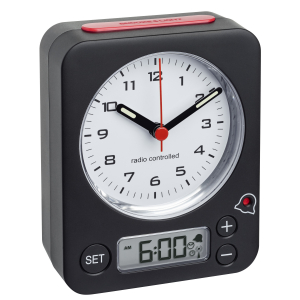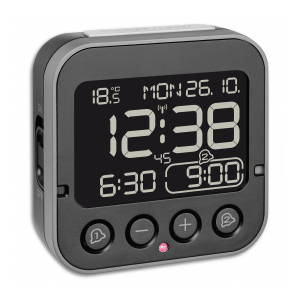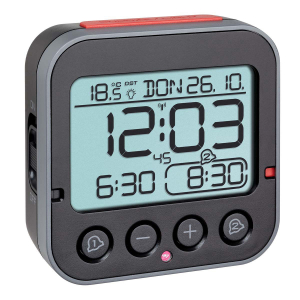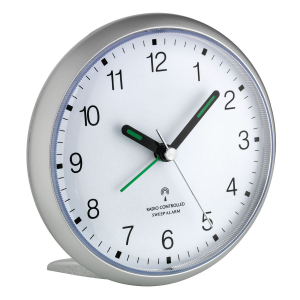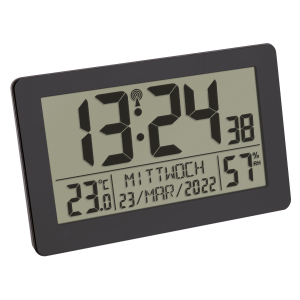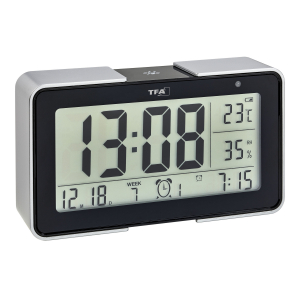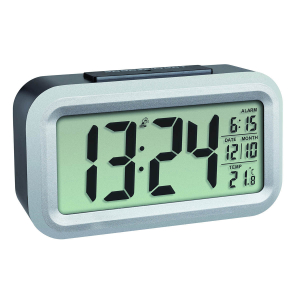Radio-controlled alarm clocks always display the exact time and adjust themselves if necessary. You can rely on the time display. When it comes to design, you have the choice between minimalism and more detailed information.
Accurate radio-controlled alarm clocks have become indispensable companions on journeys and in everyday life. Read how radio-controlled alarm clocks make it easier for you to get up in our radio-controlled alarm clock guide.
Buy radio-controlled alarm clocks from TFA Dostmann
Would you like to buy a radio-controlled alarm clock from TFA Dostmann? In our online retailers section, you can find out where you can buy these online or in stores.
Digital radio-controlled alarm clock with temperature BINGO
Item number: 60.2528
+ VARIATIONS+ 360° VIEWRadio-controlled alarm clock with digital alarm setting COMBO
Item number: 60.1511
+ VARIATIONS+ 360° VIEWDigital radio-controlled alarm clock with temperature BINGO 2.0
Item number: 60.2550
+ VARIATIONS+ 360° VIEWDigital radio-controlled alarm clock with various alarm sounds MELODY
Item number: 60.2540
+ VARIATIONS+ 360° VIEWRadio alarm clock guide
Radio-controlled alarm clocks are particularly accurate alarm clocks. These models can receive the time signal of an atomic clock sent by electromagnetic waves. To keep the time display accurate, a radio-controlled alarm clock synchronises itself regularly with the atomic clock.
Which is the best radio-controlled alarm clock?
A radio-controlled alarm clock should wake you up on time and reliably. Make sure that the functions are tailored to your needs.
Here, you will find the most important purchase criteria:
- Display format for time (12 hours or 24 hours)
- Lighting options, such as backlighting at the touch of a button, automatic night lighting, setting of display brightness (e.g. for light sensitivity)
- Power supply: Battery or mains adapter
- Radio-controlled alarm clock with vibration or different alarm tones, such as rising or high volume alarm for people with impaired hearing or deep sleepers
- Snooze – snooze function
- Multiple wake-up times for couples or the weekend
- Additional functions, such as weather conditions or room temperature
What can a radio-controlled alarm clock do?
Radio-controlled alarm clocks offer maximum convenience with accurate timekeeping. The automatic time setting by radio is convenient. There is no need for a manual time change between summer and winter time.
With a radio-controlled alarm clock that automatically synchronises with an atomic clock on a regular basis and displays the current time to the second, you don’t have to worry about waking up on time. You also have the choice of other functions:
Analogue or digital radio-controlled alarm clock?
A key distinguishing feature of radio-controlled alarm clocks is the way they display the time: There are alarm clocks with an analogue dial and devices with a digital display.
Analogue radio-controlled alarm clocks have a classic dial with hands (hour and minute hands, often also a second hand). Analogue devices are often good basic models and offer the most important basic functions:
- They display the time to you and wake you with an alarm.
- Some analogue radio-controlled alarm clocks also have a doze or snooze function and a light button.
- On some models, the analogue dial is supplemented by a digital display. This can be a temperature or date display or the alarm time for minute-by-minute setting.
Digital radio-controlled alarm clocks display the time digitally. They often have more functions than analogue alarm clocks:
- For example, in addition to the time, they can also display the room temperature, the current date or the weather conditions.
- Besides the additional functions, radio-controlled alarm clocks have yet another advantage: They are easier to read.
Alarm clock ticking
Does the ticking of your alarm clock bother you at night? Then, take note of the TFA quality symbol with the crossed-out “Tick-tock” icon.
Display lighting
So that you can also read the display easily at night, many models have light elements or a bright backlight that comes on for a few seconds at the touch of a button.
To be able to read your alarm clock throughout the night, we recommend a radio-controlled alarm clock with luminous numerals or a soft permanent night light that switches on automatically via a light sensor in the dark.
You can recognise these devices by the TFA “Eco Light Sensor” quality mark.
Radio-controlled alarm clock with mains operation or battery
There are alarm clocks that are powered by mains adapter or USB connection and those that only run on batteries.
Radio-controlled alarm clocks with permanent illumination or projection have higher energy requirements and almost always need a mains connection. Often, there is a backup battery for emergency operation in case of power failure.
Battery-operated radio-controlled alarm clocks, on the other hand, can be set up flexibly, independently of power sockets. However, be aware that batteries have a limited life span and check the charging status from time to time.
New to the market are radio-controlled alarm clocks that are charged via a USB charging cable.
Wake-up call: Alarm
Depending on the model, you can choose between different alarm sounds, such as buzzing, beeping, music or even light.
Many radio-controlled alarm clocks have a rising alarm tone. The alarm slowly increases in volume and frequency. For people with impaired hearing or very deep sleepers, there are particularly loud alarm tones or alarm clocks with vibration.
Vibrating alarm clocks were originally developed to help people with hearing loss. But anyone who does not wake up or wakes up poorly with normal alarm sounds can also benefit from these models with a vibrating alarm signal.
Snooze button – snooze function
With the snooze function, you can be woken again a few minutes later. This repeat alarm is practical if you don’t want to get up at the same time. With some radio-controlled alarm clocks, you can individually set the length of time until the alarm clock rings the next time.
Alarm times
Some radio-controlled alarm clocks offer you the option of setting several alarm times.
Ideal for couples who need a different time setting, for shift workers or for the weekend.
Radio-controlled alarm clocks: Compact & robust
Small radio-controlled alarm clocks with plastic housings are ideal as travel alarm clocks for when you’re on the move and even fit in your hand luggage. Models with an integrated night light or backlight help you to orientate yourself in unfamiliar surroundings.
Useful special functions
An optimal room climate is very important for a restful sleep, especially in bedrooms. Since the radio-controlled alarm clock is digital, many additional functions can be integrated.
Thermometers that measure the temperature in your bedroom and hygrometers that display the current humidity are very helpful. This way, you know at a glance whether you should air your room again to let in fresh air before going to bed.
Some models have a date display or allow you to see the weather conditions. If you like to start the day with music or the news, radio alarm clocks are a good choice.
With light alarm clocks, you can wake up gently. The simulated sunrise lets you start the day relaxed.
Projection alarm clocks with radio offer the possibility of projecting the current time or, optionally, other data onto the ceiling. This way, you always have the time in front of your eyes at night and never have to look for the right button for the display illumination again.
Is a radio-controlled alarm clock harmful?
Some household appliances emit radiation, which is called electrosmog. However, this mainly concerns devices that send their own signals, such as computers and laptops, smartphones and TVs that connect wirelessly to your home network.
Radio-controlled alarm clocks, on the other hand, are only receivers and receive the time signal by radio. This means that the alarm clock itself does not emit any radiation. So, there is no need to worry about exposure to electrosmog. Radio-controlled alarm clocks are, therefore, harmless to health.
